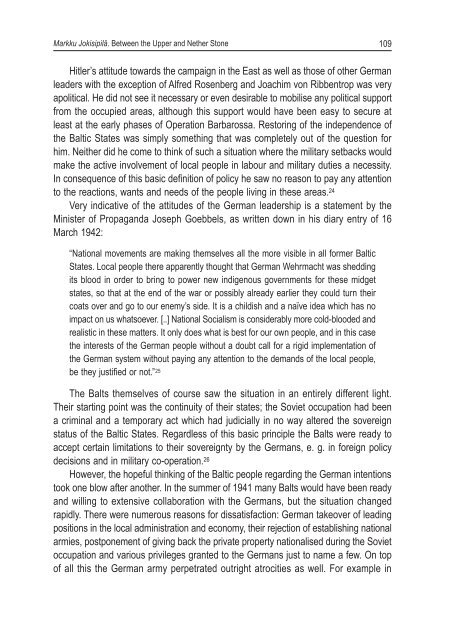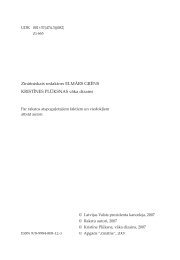15.sējums - Valsts prezidenta kanceleja
15.sējums - Valsts prezidenta kanceleja
15.sējums - Valsts prezidenta kanceleja
You also want an ePaper? Increase the reach of your titles
YUMPU automatically turns print PDFs into web optimized ePapers that Google loves.
Markku Jokisipilä. Between the Upper and Nether Stone<br />
Hitler’s attitude towards the campaign in the East as well as those of other German<br />
leaders with the exception of Alfred Rosenberg and Joachim von Ribbentrop was very<br />
apolitical. He did not see it necessary or even desirable to mobilise any political support<br />
from the occupied areas, although this support would have been easy to secure at<br />
least at the early phases of Operation Barbarossa. Restoring of the independence of<br />
the Baltic States was simply something that was completely out of the question for<br />
him. Neither did he come to think of such a situation where the military setbacks would<br />
make the active involvement of local people in labour and military duties a necessity.<br />
In consequence of this basic definition of policy he saw no reason to pay any attention<br />
to the reactions, wants and needs of the people living in these areas. 24<br />
Very indicative of the attitudes of the German leadership is a statement by the<br />
Minister of Propaganda Joseph Goebbels, as written down in his diary entry of 16<br />
March 1942:<br />
“National movements are making themselves all the more visible in all former Baltic<br />
States. Local people there apparently thought that German Wehrmacht was shedding<br />
its blood in order to bring to power new indigenous governments for these midget<br />
states, so that at the end of the war or possibly already earlier they could turn their<br />
coats over and go to our enemy’s side. It is a childish and a naïve idea which has no<br />
impact on us whatsoever. [..] National Socialism is considerably more cold-blooded and<br />
realistic in these matters. It only does what is best for our own people, and in this case<br />
the interests of the German people without a doubt call for a rigid implementation of<br />
the German system without paying any attention to the demands of the local people,<br />
be they justified or not.” 25<br />
The Balts themselves of course saw the situation in an entirely different light.<br />
Their starting point was the continuity of their states; the Soviet occupation had been<br />
a criminal and a temporary act which had judicially in no way altered the sovereign<br />
status of the Baltic States. Regardless of this basic principle the Balts were ready to<br />
accept certain limitations to their sovereignty by the Germans, e. g. in foreign policy<br />
decisions and in military co-operation. 26<br />
However, the hopeful thinking of the Baltic people regarding the German intentions<br />
took one blow after another. In the summer of 1941 many Balts would have been ready<br />
and willing to extensive collaboration with the Germans, but the situation changed<br />
rapidly. There were numerous reasons for dissatisfaction: German takeover of leading<br />
positions in the local administration and economy, their rejection of establishing national<br />
armies, postponement of giving back the private property nationalised during the Soviet<br />
occupation and various privileges granted to the Germans just to name a few. On top<br />
of all this the German army perpetrated outright atrocities as well. For example in<br />
109









